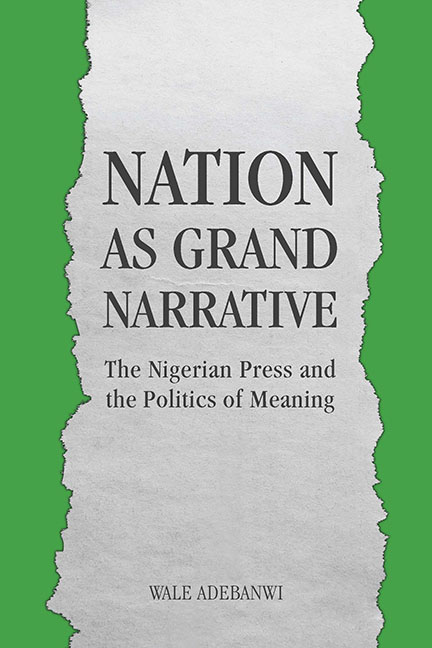Book contents
- Frontmatter
- Dedication
- Contents
- List of Illustrations
- Acknowledgments
- Part I Contextual and Conceptual Perspectives
- Part II Colonial Agency and Counterhegemonic Struggles
- Part III Inclusion, Exclusion, and Democratic Contestations
- 5 Paper Soldiers: Narratives of Nationhood and Federalism in Pre–Civil War Nigeria
- 6 Representing the Nation: Electoral Crisis and the Collapse of the Third Republic
- 7 The “Fought” Republic: The Press, Ethno-Religious Conflicts, and Democratic Ethos
- Part VI Domination and Resistance in Majority-Minority Relations
- Conclusion: Beyond Grand Narratives
- Notes
- Bibliography
- Index
7 - The “Fought” Republic: The Press, Ethno-Religious Conflicts, and Democratic Ethos
from Part III - Inclusion, Exclusion, and Democratic Contestations
Published online by Cambridge University Press: 16 February 2018
- Frontmatter
- Dedication
- Contents
- List of Illustrations
- Acknowledgments
- Part I Contextual and Conceptual Perspectives
- Part II Colonial Agency and Counterhegemonic Struggles
- Part III Inclusion, Exclusion, and Democratic Contestations
- 5 Paper Soldiers: Narratives of Nationhood and Federalism in Pre–Civil War Nigeria
- 6 Representing the Nation: Electoral Crisis and the Collapse of the Third Republic
- 7 The “Fought” Republic: The Press, Ethno-Religious Conflicts, and Democratic Ethos
- Part VI Domination and Resistance in Majority-Minority Relations
- Conclusion: Beyond Grand Narratives
- Notes
- Bibliography
- Index
Summary
Chapter 6 considered the relationship between identity politics and democracy in Africa and the challenge of reconciling democratic freedom with the limitations and opportunities of ethnic or ethnonationalist (and also faith-based) claims. This chapter analyzes democratic and identitarian narratives reflecting antagonistic and competing claims within the Nigerian national space and the dangers that these represent for national democratic life in Nigeria.
Nigeria's Fourth Republic, which commenced on May 29, 1999, almost six years after the Third Republic was aborted, provided yet another opportunity for ethno-regional and religious identities to engage in simultaneous contests for supremacy or accommodation within a democratic context. A key criticism of the press in Nigeria is that it is overtly “sectional”—as demonstrated in the previous chapters— both in its coverage of events and its canvassing of perspectives. For instance, although noting the critical role of the press in sustaining democracy in Nigeria, Sam Oyovbaire, the former information minister, argues that the press “could do well only if its mindset or worldview was much more robust and comprehensive than as presently designed by history.” He adds that the press “should provide accommodation for the complex and pluralistic corporate Nigerian society.” Odia Ofeimun, poet, journalist, and political scientist, concedes that the press “has not been able to avoid a parochial edge to its reports and comments,” despite that it has sometimes “displayed a certain readiness to outgrow sub-national considerations, especially in matters of political integrity and fiscal probity.”
The crisis precipitated by the annulment of the June 12, 1993, presidential election, which had consumed two governments— Babangida's and the Interim National Government headed by Ernest Shonekan (August 27–November 17, 1993)—also consumed the Abacha regime, its leader, General Sani Abacha, and the “symbol of June 12,” Moshood Abiola, who both died in Abuja on June 8, 1998, and July 7, 1998, respectively. Whereas Abacha's death was a welcome relief to many, given the unprecedented scale of arrest, detention, execution, and assassination of dissenting figures during his rule, Abiola's death was seen by a significant section of the country as putting “Nigeria on the cross,” with the attendant implications for the feared disintegration of the country. However, the death of the General Abacha and Chief Abiola could be viewed as the termination of a national debacle with potential opportunities for a new, though not necessarily fresh, beginning for a much troubled polity.
- Type
- Chapter
- Information
- Nation as Grand NarrativeThe Nigerian Press and the Politics of Meaning, pp. 190 - 224Publisher: Boydell & BrewerPrint publication year: 2016



